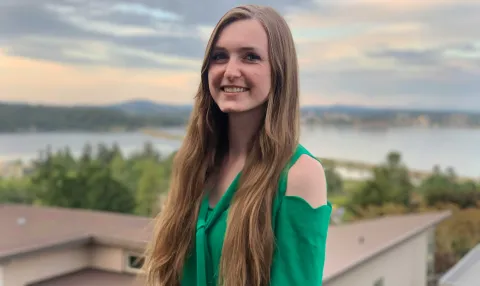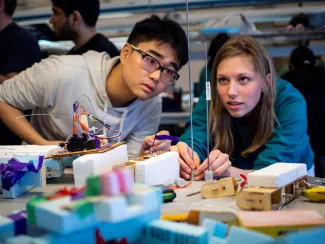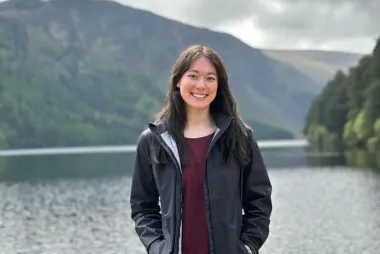"I strive to use the skills I developed during my time at UBCO to make a difference in the medical field with the hope of making human life better!"

Emily Earl
- Degree:
- Master of Applied Science
- Grad year: 2021
- Program:
- Campus: Okanagan
My name is Emily and I began my UBCO journey in 2014 with a B.A.Sc in Mechanical Engineering and continued it in 2019 with a M.A.Sc in Mechanical Engineering.
I spent as much of my time as possible at UBC learning from others. Of course, a portion of this was learning the fundamentals from courses, but I also spent a large amount of time in the last few years of my undergraduate degree working in various research labs on campus. Working in the labs allowed me to incorporate some of the skills I learned from my degree to real life projects and encouraged me to further think outside the box.
Now that I have started my master’s degree, I get to continue my personal learning while spending some of my time helping others learn as well! Two summers ago, I acted as a mentor for the Stewards in Engineering Education (SEED) program and encouraged two high school students to build a device on their own which is still actively used in the Advanced Thermofluidic Laboratory. Since then, I have continued to introduce undergraduate students into the lab and show them what research can look like, just as someone did for me in my undergraduate degree. As I continue to learn, I hope that I can pass on just as much knowledge to others around me!
Why did you choose to go into your field of study at UBC?
When I was applying to undergraduate programs in my final year of high school, UBCO was my number one choice – it held the impressive UBC title, but packed it into a smaller, more cozy-feeling campus. At the time, only Electrical, Mechanical, and Civil engineering options were available for students. While I loved the campus, I knew I wanted to pursue something in the biomedical engineering field, so I had reached out to a few research labs to discuss potential biomedical research projects for upcoming master’s students. This led me to the Advanced Thermofluidic Laboratory (ATFL) where I began working as an undergraduate researcher in my final year. After spending some time in the lab and getting to discover all of the ongoing projects, I realized that I loved the ATFL team and decided to continue my studies here with a master’s degree!
What has made your time at UBC memorable?
A big part of why UBCO has stuck with me over the years is the people. When I first started working in the lab, I had made a small group of lab friends and every day, our little group would go eat lunch together behind the engineering building. We would chat, play frisbee, and enjoy our time in the sun. Over the years, our lunch group has gotten smaller, then bigger, then smaller again, but whenever life permits, we still make sure to have our lunch together and chat while enjoying the sun.
What has been your most valuable non-academic experience studying at UBC?
Definitely the little lab get-togethers! All of the hikes, days at the beach, movie nights, surprise birthday parties and other events allow for the chance to get to know people on a deeper level than what can be achieved by simply running into each other in the lab. They help introduce new members of the lab to UBC and reduce a lot of the stress associated with joining a new group! Even though I have only been working at the Advanced Thermofluidic Laboratory for a couple years, I already feel like some of my best friendships have been developed here and I know that many more are yet to come!
Tell us about your experience in your program. What have you learned that is most valuable?
The most valuable skill that I learned during my master’s program is how to embrace failure. Before I began studying at UBC, I was terrified of making mistakes, but engineering has shown me that sometimes you need to fail before you can approach success. Failure can help outline different advantages and limitations, can help provide a clear path for improvement, and can be the first step towards something amazing. Learning to recognize failure as an actual part of the process and not a hindrance to it is a very important lesson.
How are you applying the skills you learned through your studies at UBC?
After I finish my M.A.Sc, I plan to rejoin the ATFL as a laboratory technician! While I have had an amazing time working on my own research project, I have also really enjoyed helping introduce undergraduate students to the lab and encouraging them at the start of their own research journeys. By continuing to work in the lab, I will be able to help support our current undergraduate students as well as those to come!
What advice would you give a student entering your degree program?
Remember to be kind to yourself. A master’s degree is a lot of work, a lot of your time will be spent reading, writing, performing experiments, and discussing the odds and ends of your project with others. While it is important to work hard, it is also important to rest. Make sure to set aside some time for yourself to visit with friends, do the things you love, and get a good night’s sleep – I can promise you, you are worth it.
How do you feel your degree has benefitted you compared to a different field of study?
Engineering helped me learn how to problem solve, think creatively, and adapt to change. As an undergraduate student, these concepts are introduced through group projects. Often times things will go wrong – prototypes won’t end up working like you had envisioned them, team members will disagree on how to fix them, and it can be difficult to determine a way to move forward. Learning to communicate effectively with team members and work together is an essential skill that everyone will likely need at some point in their life, and studying engineering provides a path to do so. While problem solving, creative thinking and the ability to adapt are skills used for engineering design, they are also essential for communicating and working as a team and it is easy to forget that!
Where do you find your inspiration?
My inspiration comes from all around me! Working in a lab with a bunch of individuals who are all so incredibly passionate about their research makes it easy to be inspired. Regardless of how different our projects may be, the excitement, confidence, and curiosity are all contagious and spread throughout the lab!
I am also inspired by the desire to make life better. After I spent time researching for my current project, I noticed that there are many gaps in knowledge regarding currently used heartburn medications and the same is likely true for a variety of different medications and treatments out there. If I can somehow contribute to closing even one of those gaps, it could help plenty of people someday and the thought of that alone is incredibly powerful.
What are your future plans to make a difference in our world?
The medical industry is one where the need for improvement will always exist. People are continually in need of better medications, more effective treatments, and optimized medical equipment. Although perfection can never be achieved, advances in human health happens every day and can change someone’s quality of life dramatically. I strive to use the skills I developed during my time at UBCO to make a difference in the medical field with the hope of making human life better!



